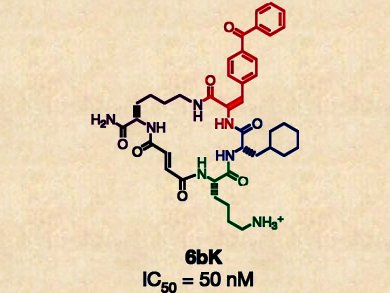Type-2 diabetes is a severe metabolic disease caused by the loss of the cells producing the hormone insulin. Since this molecule controls the up-take of glucose from the circulation, diabetic patients accumulate pathological levels of sugar in their blood.
David Liu, Harvard University, Boston, USA and co-workers discovered a molecule that may lead to a new way to treat diabetes. The new compound, 6bK (pictured), is a synthetic macrocycle that powerfully and selectively inhibits insulin-degrading enzyme, a metalloprotein that breaks down insulin molecules.
When tested in animal models of the diabetic disease, 6bK impeded insulin degradation and increased its activity, thereby lowering blood glucose levels. The pharmacological inhibition of the insulin-degrading enzyme has, therefore, an important anti-diabetic effect and may constitute a novel therapy for diabetic patients.
- Anti-diabetic activity of insulin-degrading enzyme inhibitors mediated by multiple hormones,
Juan Pablo Maianti, Amanda McFedries, Zachariah H. Foda, Ralph E. Kleiner, Xiu Quan Du, Malcolm A. Leissring, Wei-Jen Tang, Maureen J. Charron, Markus A. Seeliger, Alan Saghatelian, David R. Liu,
Nature 2014.
DOI: 10.1038/nature13297




